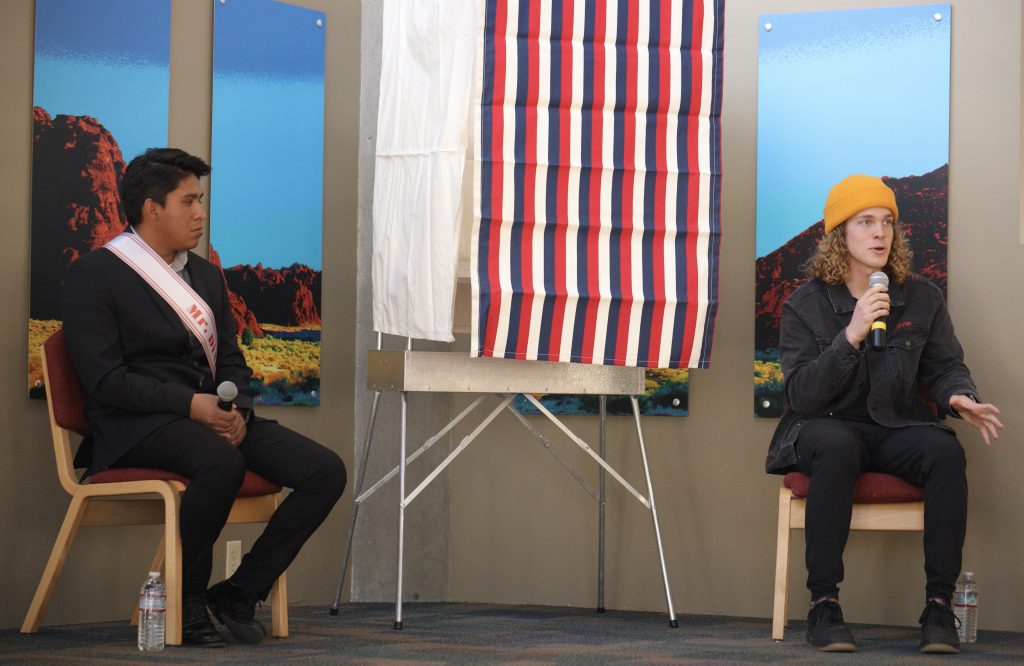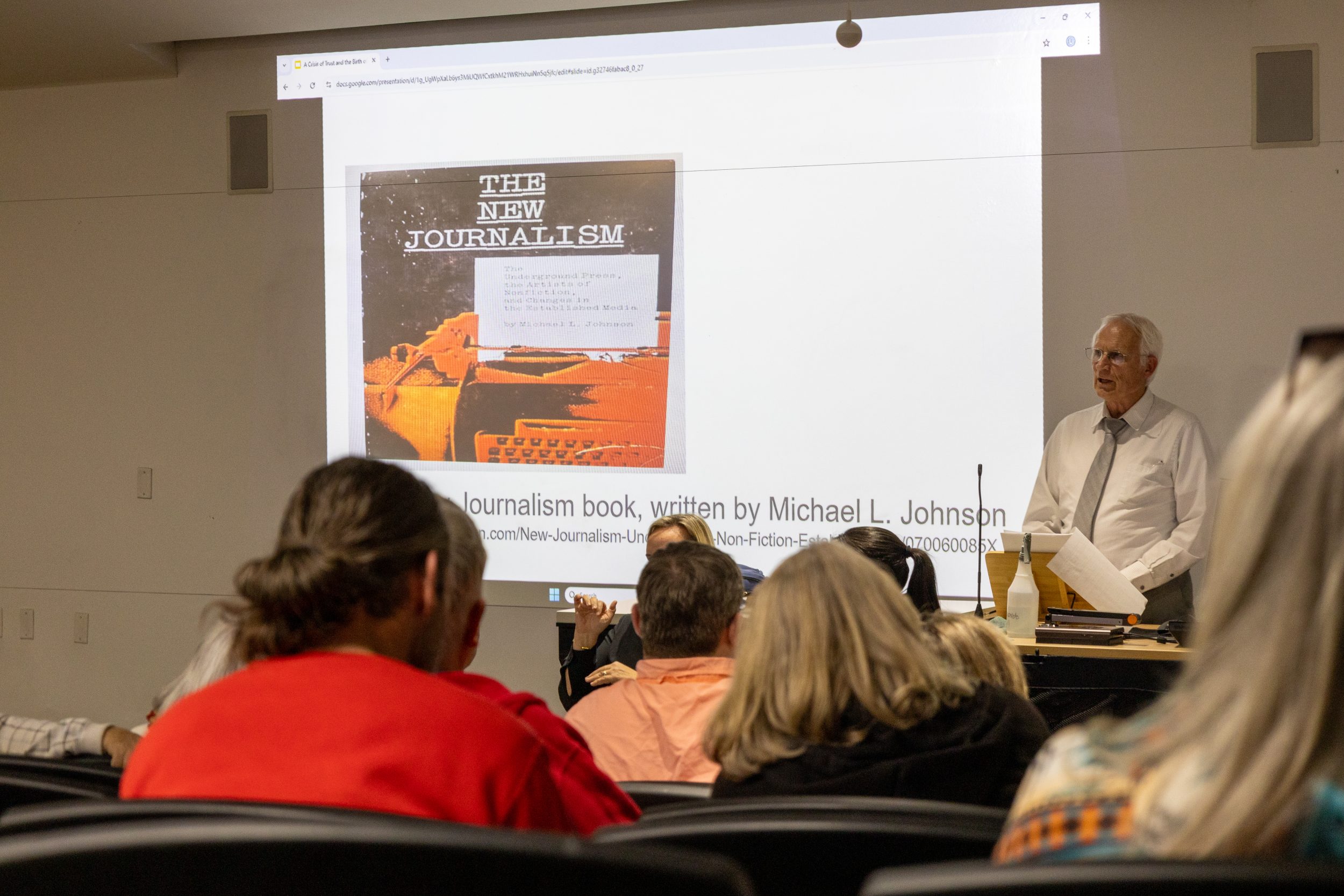When the lawsuit against Utah Tech University administrators was released to the public, students, faculty and staff experienced a multiplicity of events.
This 42-page lawsuit named 13 administrative faculty and staff, as well as the Utah Board of Higher Education, the Utah System of Higher Education, Utah Tech University and the Office of the Commissioner of Higher Education.
This lawsuit was a result of repeated discriminatory, harassing behavior that three Utah Tech employees faced. These employees were:
- Rebecca “Becky” Broadbent, general counsel
- Jared Rasband, senior associate general counsel
- Hazel Sainsbury, director of equity compliance and Title IX coordinator
This lawsuit shed light on what was going on inside Utah Tech. A court date has yet to be released to the public, even after the 2024 semester ended.
However, many things have changed around campus since the release of this lawsuit. First, quickly after the lawsuit was released, the Utah Tech Faculty Senate proposed a resolution to faculty members regarding administration.
The proposed resolution included a vote of no confidence in administration with executive duties in leadership positions which included:
- Interim president Courtney White
- Provost Micheal Lacourse
- Del Beatty, vice president of student affairs
- Jordon Sharp, vice president of marketing and communication
- Henrie Walton, assistant to the president for government and community relations and interim chief of staff
- Travis Rosenberg, executive director of human resources
A section of this proposed resolution states:
The resolution continues, saying the faculty senate will meet with the general faculty Nov. 20, 2024 to recall for the following actions: reviewing the allegations against the university and ensuring accountability, strengthening protections for whistleblowers, publicly sharing and detailing a plan addressing a recommitment to fostering a respected workplace culture, and acknowledging the apology issued by Courtney White to faculty and staff.
Robert Hall, assistant professor of communication and faculty senator for the communication department, said: “We didn’t just do this on behalf of faculty; we did take into consideration the student’s concerns. After we saw the news piece from the Sun News, I reached out to our senate president, president-elect and other members and said, ‘Our students are calling this out, we cannot be quiet.'”
After voting in favor of the resolution, the faculty senate met with Geoffrey Landward, Utah System of Higher Education chancellor, to express their concerns and aspirations for a new president.
Hall said it was a good opportunity to meet and discuss their concerns with him and they have been meeting regularly with the board of trustees since their initial meeting.
The Faculty Senate also hoped to bridge the gaps between administrators, students, faculty and staff. Hall said they are trying to figure out how to collaborate and be in the same lane rather than having faculty and students in one lane and administration in the other. The board of trustees has been working with the faculty senate to resolve this.
The second change occurred during the 2024 winter break, Dec. 24, when the Utah Board of Higher Education emailed the campus community to announce a new presidential search committee.
Student body president, Bella Estes, a senior communication major from Scottsdale, Arizona, said she was surprised they were establishing a new search committee.
In this email, UBHE announced that it had established a 10 member search committee to expedite the search for a new president.
Furthermore, the committee included Utah Tech and Utah Board of Higher Education trustees faculty, staff, students, alumni, administration and the local community, all of which will decide who the new president is.
These members were:
- Danny Ipson, search committee co-chair and Utah Board of Higher Education member
- Deven Macdonald, search committee co-chair and Utah Tech board of trustees member
- Wendi Bulkley, Utah Tech director of community relations and athletic development officer
- Jennifer Ciaccio, Utah Tech Faculty Senate president-elect and biology professor
- Jon Cox, UBHE member
- Bella Estes, Utah Tech student body president
- Dan Nielson, alumni, Utah Tech administrator, Coral Desert Surgery Center administrator
- Rich Nye, Utah governor’s senior adviser of education
- Tasha Toy, assistant vice president and chief compliance officer at Utah Tech
- John Willis, St. George city manager
In the email, the UBHE stated they understood the importance of this transition and, “want to reassure you that every effort is being made to select a president who will lead by example, elevate UT’s mission of innovation, strengthen the campus community, and further advance hands-on, student-focused learning.”
Moreover, on Jan. 9, UBHE held a Committee of the Whole meeting, during which they discussed the reasoning behind creating a new committee.
Utah System of Higher Education board member, Javier Chavez Jr., said they were determined to reconstitute a new committee to have a fresh perspective and fresh start.
Chavez said: “The search committee is proceeding on an expedited basis with the goal to appoint a new president by early March. That area of the state, that community, that university requires the care and attention for a president; therefore, the decision has been made to expedite the search. I want to reiterate by no less, does that mean that it’s a hurried search.”
With the formation of the new committee, a expedited timeline was also created, which proposed a new president by March 2025. However, the committee was not the only thing that changed with the presidential search. The presidential position details and requirements were updated when the search was announced.
The new, largest change made was lowering the minimum education requirement for prospective presidents. Now, applicants are no longer required to hold a doctorate and can maintain a minimum of a bachelor’s degree.
“There are things we are still not happy with,” Hall said. “One thing we are very displeased about is that they changed the qualifications.”
While a graduate degree is still preferred, the minimum qualification could change the application pool significantly, creating the possibility that most of the faculty would be more educated than the president.
Estes said the qualification changed to broaden the overall scope. She said the committee would still do its due diligence and ensure the new president has leadership experience and upholds the university’s values.
“I would anticipate some people being frustrated, but I’m not quite sure because we wouldn’t know who that applicant is yet, so I can’t speak on it,” Estes said.
Once the committee narrows down to three to five finalist candidates, they will come to Utah Tech to meet with different stakeholders. Estes said these stakeholders represent different perspectives on campus and around the community.
“Those groups in those stakeholder groups get to share their feedback on those three to five candidates,” Estes said.
As the student representative on the search committee, Estes was advised to pick 10-12 students to represent the student body.
“I wanted to pick students who represent different areas, so I picked my UTSA executive council because they oversee different branches,” Estes said. “Then I chose student groups who oversee a large number of students in different branches.”
She also picked a student representative from the Peer Coach program who works with first-year students, a representative from the Ambassador Program who works with prospective students, and a representative from the Alumni Ambassadors. Estes said once the stakeholders met, USHE would pick a finalist who may come speak at the university.
“I appreciate everyone’s patience on this. This has been a very sensitive challenging topic,” Chavez said. “The system [of higher education’s] goal is that the people of Utah win, the students win.”
The university has experienced a myriad of changes over a short period of time. If students, faculty and staff have concerns about the presidential search, they are encouraged to provide anonymous feedback through the USHE form listed on the presidential search website.























